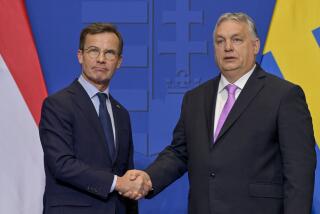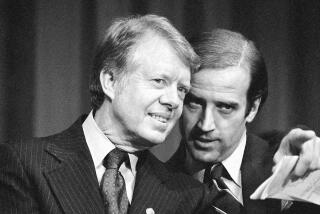Palme, the Swedish Neutral of Powerful World Persuasion
- Share via
STOCKHOLM — To many Americans, Swedish Prime Minister Olof Palme was the democratic leader who most consistently criticized U.S. policy in the world. But Palme, killed by an unknown assassin on a sidewalk here last week, was much more than that.
Over a period of nearly two decades, Palme performed a highly unusual role as a global statesman, acting on many occasions in the interest of the United States and other Western democracies to increase understanding and reduce the level of world-tension.
The extent of his contribution--and the gap left by his death--may be difficult to measure because so much of what he did was intangible--in many instances either virtually unnoticed or purposely kept quiet.
“There are few concrete results you can point to and say, ‘That is a great accomplishment,’ but he had an impact on the world’s conscience,” said Nordal Akerman, who heads the Swedish Institute of International Affairs. “He changed people’s view of things.”
The Commission on Disarmament and Security Issues that bears Palme’s name has produced no great breakthrough, nor has the so-called Five-Continent Peace Initiative he helped establish in the spring of 1984. In fact, many people see the work of such groups as irrelevant. But these groups have served as platforms for new ideas and, more important in the short term, as points of contact between nations of widely differing ideologies.
As the leader of an affluent, neutral, democratic country, Palme was in a position of quiet power, the statesman who could hold the important center ground between East and West. And although he sometimes angered leaders on all sides, he consistently commanded their respect. Among those who called to express anguish the day after his death were former Secretary of State Henry A. Kissinger and President Daniel Ortega of Nicaragua.
The cumulative effect of Palme’s work was to reduce tension and promote understanding in ways that benefited all nations. It is not widely known, for example, that under his leadership Sweden played a key role in breaking Israel’s resistance to participating on international bodies. And last fall, the Swedes short-circuited Arab attempts to have Israel’s credentials rejected at the United Nations.
Palme opposed the U.S. withdrawal in 1984 from UNESCO (the U.N. Educational, Scientific and Cultural Organization), but he is said to have been deeply involved in pressing for changes that the United States demanded, including a reduction of the powers of UNESCO’s controversial director, Amadou M. M’Bow of Senegal.
Palme’s forceful personality and political independence gave him a special mobility. In late 1974, when it appeared that a group of leftist Portuguese military officers were preparing to topple the fragile democratic government in Lisbon, Palme invited them to Stockholm, drawing criticism from Western nations that had urged a policy of isolating these men. Palme then asked his Portuguese guests, the generals and admirals, to attend sessions of the Swedish parliament, to meet with individual legislators and to visit other elements of Sweden’s strong democracy; in the process, he was delivering the message that such a democratic government can work.
His stands against U.S. action in Vietnam, against South Africa’s policy of apartheid, and for a more equitable distribution of the world’s wealth between rich nations and poor were viewed with admiration by leaders not usually friendly to the West. That Palme represented a neutral country, with nothing to gain nothing from these stands, enhanced his credibility.
But it was the force of his personality and a gift for languages--he spoke French, English and German fluently in addition to his native Swedish--that enabled him to convert neutrality into something forceful and positive. A Swedish official who worked with Palme for years said he “had a persuasive, strong way of conveying his beliefs.”
Akerman, the head of the Institute of International Affairs, said: “On the international scene, he spoke for common sense and compassion. The poor part of the world felt they had a friend.”
Although he managed to accomplish little in concrete terms to alleviate the suffering of the poor nations, his concern and commitment became, for many in the Third World, a symbol of hope.
And although his accomplishments in many instances were limited, they were significant within context. For example, as the personal envoy of the U.N. secretary general on a mission to mediate the war between Iran and Iraq, Palme failed to bring the two sides to the negotiating table. But then, in 1984, he got the two countries to agree not to launch attacks on civilian populations. Even that accord held up for only nine months--but did save thousands of lives while it lasted.
Palme’s successor, Ingvar Carlsson, is a talented politician, but he is not likely to fill Palme’s shoes on the international scene. Repeatedly Carlsson has emphasized the need for continuity, and he has indicated that he will be active internationally, but he lacks Palme’s experience in foreign affairs.
“Palme and Carlsson were close friends for many years, but they are personality opposites,” said a foreigner who lives here and knows them both well. “Palme had strong political instincts and a genius for taking an unusual move yet landing on his feet. Carlsson is a competent man but a plodder. He moves one step at a time.”
Finding another statesman to fill the void left by Palme’s death is likely to be a difficult task. Akerman said: “Palme forced issues onto the scene and made people think about them. I can’t see anyone replacing him.”
More to Read
Sign up for Essential California
The most important California stories and recommendations in your inbox every morning.
You may occasionally receive promotional content from the Los Angeles Times.










